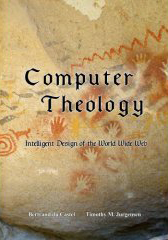PRESS
COMPUTER THEOLOGY |
||||
|
prevailing
environmental conditions over a long period of time. We would be hard pressed
to determine through a cursory analysis the natural selection benefit or
liability of such characteristics. Natural
selection, as initially proposed by Certainly, from
their membership in a group the individual members of a species may well
receive a benefit relative to individual selection since propagation of the
species is a product of individual propagation. However, it also appears
relatively assured that groups are beneficial in that they extend the natural
selection process from a simple gauge of individuals (a single level selection
process) to a more complex gauge of individuals, first as members of a group
and then as individuals, thus resulting in a multi-level natural selection
process. We can therefore encompass the concept of multi-level selection within
our working definition of natural selection by defining the concept of
multi-level selection as: In a group
under threat, transmissible traits of the individuals within the group that
minimize that threat grow at the expense of traits that don’t. For the moment,
this definition certainly begs the question of what the transmission mechanism
might be. For the individual organism, DNA provides such a mechanism. We will
defer until a later chapter a consideration of a potential mechanism for
groups. Indeed, what we do see at this point is that evolution applies to all
venues of life, and within the human species, various grouping mechanisms are
certainly consistently recurrent venues. A recurring theme within these venues
is that of sacrifice. Sacrifice is a concept that is counter-intuitive when
considering the process of natural selection. Sacrifice, by its very
definition, suggests that an individual performs some act, either consciously
and subconsciously, that may well be detrimental to that individual and yet
beneficial to another. Should the act result in the death of the individual,
then there is no opportunity for that trait, the trait of sacrifice itself, to
be further propagated to a new generation. Hence, it would seem that natural
selection, over time, would remove the concept of sacrifice from the
vernacular; but this would not appear to be the case, with many species. In Africa, wildebeest are documented to cross a river full of crocodiles, letting some die while the majority makes it safely to the other side. The threat stems from the initial situation that there is not enough food for the herd. One might speculate that there would be enough food for any one wildebeest, if all the others were gone. So, no wildebeest would seem to have an incentive to cross the river. In fact, it would seem that the paramount incentive would be to let the other wildebeest cross. Apparently, however, wildebeest do not like to live alone. Hence, the recurring scenario that plays out with every cycle of the wet season turning to dry finds the herd moving to new grazing grounds. When the herd encounters the river, the individual members plunge into the |
||||
|
||||
© Midori Press, LLC, 2008. All rights reserved for all countries. (Inquiries) The contents of ComputerTheology: Intelligent Design of the World Wide Web are presented for the sole purpose of on-line reading to allow the reader to determine whether to purchase the book. Reproduction and other derivative works are expressly forbidden without the written consent of Midori Press. Legal deposit with the US Library of Congress 1-33735636, 2007.
|
ComputerTheology Intelligent Design of the World Wide Web Bertrand du Castel and Timothy M. Jurgensen Midori Press, Austin Texas 1st Edition 2008 (468 pp) ISBN 0-9801821-1-5 |
Book available at Midori Press (regular) |
